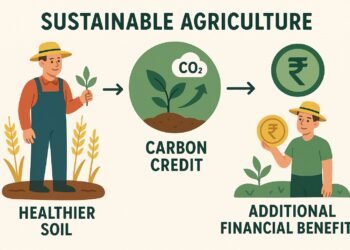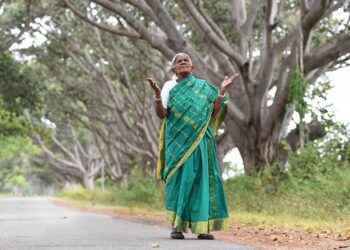For sustainability leader Rusen Kumar, ‘Saalumarada’ Thimmakka‘s death is more than a personal loss — it is a national environmental tragedy.
BENGALURU (India CSR): India awoke on November 14 to the news that 114-year-old ‘Saalumarada’ Thimmakka, one of the country’s greatest environmental custodians, had passed away. Her death is not merely an obituary moment — it is a civilizational moment, one that compels India to ask: What is the value of an environmentalist in a country losing its trees every day?
Thimmakka was not just a woman; she was a movement, a moral reminder of the relationship between human beings and nature. Her legacy stands rooted in the 385 banyan trees she planted with her husband, each nurtured as if it were her biological child. She spent decades under the harsh Karnataka sun, watering saplings, shielding them from cattle, storms, and drought — building a living green corridor on State Highway 94.
Her passing has triggered waves of grief. But for some, especially those who work closely with climate, social responsibility, and ecological governance, the news hits differently.
Among them is Rusen Kumar, Founder of India CSR and a prominent voice in sustainability discourse.
The passing of 114-year-old environmental icon and Padma Shri awardee ‘Saalumarada’ Thimmakka has triggered a wave of national mourning. But for sustainability leader Rusen Kumar, her death is more than a personal loss — it is a national environmental tragedy.
Speaking to India CSR, Kumar delivered an emotional and philosophical reflection on what India has lost with the demise of its beloved “Vriksha Mata.”
He goes further:
“Cutting trees is prominent news in India. Every week, we hear about deforestation — for roads, mines, hotels, expressways, smart cities. Everywhere, India is losing its green cover. But today, India has lost the one woman who spent her entire life trying to reverse that loss.”
“Her passing exposes the painful contradiction of our time: Those who plant trees die silently, while those who cut trees get applause in the name of development.”
Rusen Kumar’s words are not criticism — they are a mirror to India’s current state of environmental consciousness.
“When I heard the news, I felt something inside me fall silent,” says Rusen Kumar
Deeply moved by the news, Kumar said Thimmakka’s departure must be understood in the right context.
“When an environmentalist dies, we don’t just lose a person. We lose a worldview. We lose a way of life. We lose a cultural memory.”
He said Thimmakka represented a form of ecological wisdom that modern India is rapidly forgetting.
“To me, she symbolised soil wisdom, ecological motherhood, and human–nature harmony.”
***
“Her passing is an environmental loss, not just a human loss.”
Kumar emphasised that Thimmakka’s death must be seen against the backdrop of India’s rising ecological destruction.
“I see her passing as an environmental loss because India is already struggling with ecological destruction. Every day, we hear about forests being cut, rivers being polluted, hills being flattened. But very rarely do we hear about someone creating a forest. She was that rare person.”
***
On India’s current development model
Calling out the contradictions in India’s development trajectory, Kumar said:
“The sad reality is that in today’s India, trees survive by accident. Policies change, governments change, but the axe never stops. Projects rise, mountains fall. Roads expand, ecosystems shrink. And in this era, a woman decided to create trees, not destroy them. That is why she was special.”
***
“She planted 385 moral lessons, not just trees.”
Reflecting on the symbolic meaning of her work, he said:
“People say she planted 385 trees. But I think she planted 385 moral lessons. Each tree shows us that development and destruction are not the same. Development should serve life, not destroy it.”
***
On the hypocrisy around environmentalism today
Kumar criticised how modern environmental discourse often remains limited to rhetoric.
“Today sustainability is a fashionable word. Corporates talk about green. Politicians talk about green. Social media talks about green. Yet the land is turning brown.”
“In such a world, her life was pure. No noise. No publicity. Only action.”
***
A national contradiction exposed by her death
He added that India is losing protectors of nature faster than it is losing its natural resources.
“We are losing environmentalists on one side and forests on the other. We are losing nature’s protectors faster than we are producing them.”
“The generation that planted trees is dying. The generation that cuts trees is expanding.”
***
A lesson India must not ignore
Calling for national introspection, Kumar said:
“One woman planted 385 trees without money. Today, governments with thousands of crores cannot protect 385 existing trees. That says everything.”
“Her death should be a national environmental reflection moment.”
***
A warning for the future
Highlighting the urgency of India’s ecological crisis, he warned:
“If India continues cutting forests at the current pace, we will remember Thimmakka not as inspiration, but as warning.”
“Her life teaches us that protecting nature is not activism — it is responsibility.”
***
Why Thimmakka’s Legacy Matters Even More Today
India is increasingly experiencing the brutal impacts of climate change: heatwaves, floods, cyclones, droughts, water shortages, forest fires, and extreme air pollution.
In this context, Kumar noted four reasons why her legacy is crucial:
1. Trees are now a survival necessity, not a luxury.
2. She proved that one determined individual can create a forest.
3. She turned personal grief into a green revolution.
4. She embodied values India is rapidly losing — respect for soil, shade, water, and land.
***
A Nation Without Its Tree-Mother: What Comes Next?
With her passing, Kumar said India must confront the toughest questions:
- Who will plant the next 385 trees?
- Who will water saplings in scorching summers?
- Who will stand between forests and bulldozers?
- Who will teach children to love trees as family?
He concluded that Thimmakka’s death must mark the beginning of a renewed national movement.
“Her death must become a movement, not a moment.”
As 385 banyan trees stand silently along a Karnataka highway, they remain Thimmakka’s living memorial.
But as Rusen Kumar warns, whether India learns from her story will determine the fate of its forests — and its future.
***
Also Read: 111-year-old Environmentalist Given Status Of A Cabinet Minister, Who Is She?






















